November 19, 2021
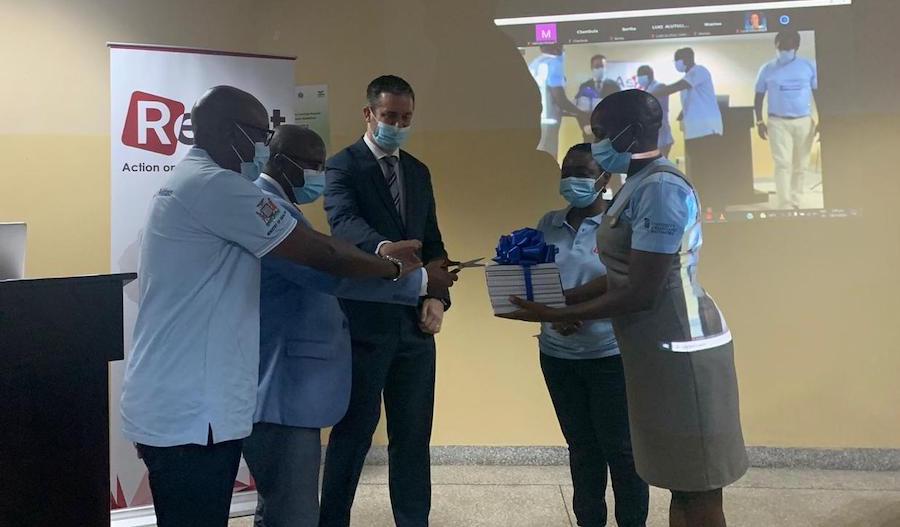 Stakeholders celebrate the launch of the antibiotics guidelines with a ribbon cutting.
Stakeholders celebrate the launch of the antibiotics guidelines with a ribbon cutting.
Ciheb and the University of Maryland, Baltimore (UMB), in conjunction with University Teaching Hospital (UTH) in Lusaka, Zambia, have created the UTH antibiotics guidelines, the first of its kind for a health facility in Zambia.
These guidelines aim to standardize antibiotic prescribing practices at UTH and improve patient management and safety.
UTH publicized the guidelines at a launch event on November 18 attended by many partners, including the Ministry of Health, Zambia Medicine Regulatory Authority, Zambia National Public Health Institute, and Centre for Infectious Disease Research Zambia, among others. The event coincided with the beginning of the World Health Organization’s Antimicrobial Awareness Week, which runs annually from November 18-24.
“This is a great milestone for UTH, and UMB is proud to have partnered with UTH in this endeavor,” said Dr. Cassidy Claassen, Assistant Professor of Medicine, Ciheb Global Health Fellowship Director, and member of the Institute of Human Virology (IHV). “These guidelines are the culmination of our work over the past seven years to improve usage of antibiotics at UTH, and we look forward to their adoption and use.”
After progress stalled due to the COVID-19 pandemic, Mona-Gekanju Toeque, MD, MPH, the Maeve Kennedy McKean (MKM) Global Public Health Fellow, helped guide the completion of the guidelines from the UMB side in collaboration with UTH over the last year.
“This is important because no hospitals in Zambia really have antibiotic guidelines to follow for prescribing,” Dr. Toeque said.
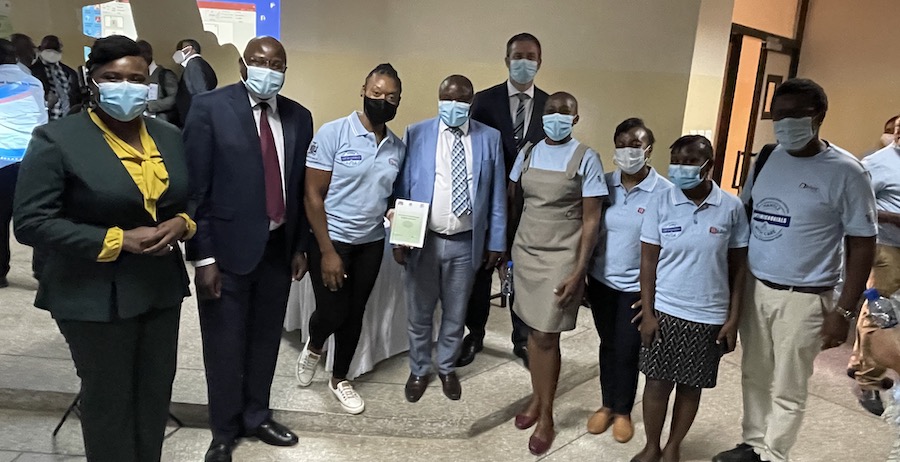
Antibiotics and antimicrobial resistance
Although antibiotics are used to treat and cure bacterial infections, they also can negatively impact the normal flora in the body. This can lead to new infections such as Clostridioides difficile (C. diff).
“Antibiotics can lead to antimicrobial resistance, and this is a huge problem because if a patient develops a drug-resistant bacterial infection, the number of antibiotics available to treat the infection may be limited,” Dr. Toeque said. “Some patients develop multi-drug resistant infections due to prolonged antibiotic exposure or because of an infection that originated from a hospital. Therefore, it is important to combat antimicrobial resistance, not only worldwide, but particularly in resource-limited settings as antimicrobial resistance can potentially contribute to morbidity and mortality.”
Dr. Toeque, who has been practicing internal medicine at UTH since July 2020, has seen firsthand the need for the antibiotics guidelines. Antibiotics are commonly initiated by doctors while working up a patient for possible hospital admission and often broad antibiotic coverage is initiated for extended durations, which increases the risk of antimicrobial resistance.
Working in Zambia also presents unique challenges to patient management. For example, patients can access some antibiotics available in outpatient pharmacies, and from the supply side, not all antibiotics that a healthcare provider might want to prescribe are available in Zambia. “The first step is making practitioners, pharmacies, and public outpatient services aware of the issues of antimicrobial resistance,” Dr. Toeque said.
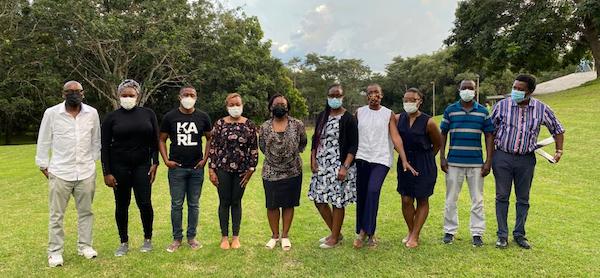 Since March 2021, Dr. Mona-Gekanju Toeque (third from right) met with UTH colleagues weekly to complete the guidelines.
Since March 2021, Dr. Mona-Gekanju Toeque (third from right) met with UTH colleagues weekly to complete the guidelines.
UMB contributions
In 2016, Ciheb helped UTH develop its first antibiogram, the results of which were published in the journal Antibiotics. Following this publication, Ciheb, in collaboration with the UMB School of Pharmacy, started assessing antimicrobial use at UTH. This led to a critical appraisal of the appropriateness of antibiotic prescribing and a deep understanding of antimicrobial use at UTH, which the researchers published in PLoS One. Although the COVID-19 pandemic paused the progress of the guidelines, Dr. Toeque and colleagues at UTH picked back up in March 2021 with weekly meetings.
The guidelines are built on microbiological cultures, cases, and other data that UMB helped gather. This informs the type of resistant patterns at UTH and the types of microorganisms that are causing infections.
In addition to Dr. Toeque, other UMB contributors include Dr. Emily Heil, Associate Professor at the School of Pharmacy and Coordinator of the Antimicrobial Stewardship Program at the University of Maryland Medical Center; Dr. Sarah Schmalzle, Assistant Professor of Medicine, Assistant Program Director of the Infectious Disease Fellowship, and member of IHV; and Dr. Lottie Hachaambwa, Assistant Professor of Medicine and member of IHV.
Dr. Toeque and the UTH Infectious Disease and Pharmacy team also worked with Ciheb to develop a mobile app, so users — which include medical doctors and students, pharmacy doctors and students, and other trainees — will have access to the guidelines electronically.
Sharing the knowledge
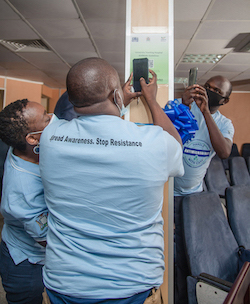
At the launch event, UTH and UMB representatives emphasized that while this is a celebratory moment for UTH, they also hope these guidelines will serve as a template for other hospitals in Zambia.
“UTH is encouraging other hospitals to look at this guideline and use that as a skeleton to create guidelines specific to their microbiological data for their facilities,” Dr. Toeque said.
Other facilities should modify and customize their antibiotic guidelines because antimicrobial prescribing practices vary based on many factors but most importantly resistance patterns. It is important to note that even within a hospital, different units can have different resistance patterns, but general principles from the UTH guidelines can be taken.
“UMB is committed to continuing to work with UTH and the Ministry of Health to further develop such initiatives,” Dr. Claassen said. “By continuing to work together, we know that the future is bright indeed.”
Contact
Center for International Health, Education, and Biosecurity
Institute of Human Virology
Anthony Okoth
Regional Communications Specialist
Related stories

Wednesday, July 17, 2024
The ZENITH Initiative - Empowering Zambia
The Zambia Education Network for Implementation Science Training in Health (ZENITH), a research training collaboration between the University Teaching Hospital (UTH) in Lusaka and the University of Maryland Baltimore (UMB), is an educational program designed to provide short-, medium-, and long-term implementation science capacity in Zambia. The aim of ZENITH is to prepare Zambian professionals with research skills and knowledge to develop HIV service delivery innovations for key and vulnerable populations to help Zambia achieve sustained HIV epidemic control.
.png)
Friday, April 12, 2024
PreVAIL Presented at CROI 2024 Conference
The Prison PrEP Values, Adherence, and Implementation (PreVAIL) study was developed to address these knowledge gaps surrounding HIV prevention among justice-involved populations. Representing a collaborative effort between UMB, CIDRZ, and Zambia Correctional Services, PreVAIL is one of the first studies observational studies on PrEP uptake, persistence, and adherence among incarcerated persons.

Wednesday, January 24, 2024
Empowering Zambian Health Professionals through the ZENITH Implementation Science Institute
The Zambia Education Network for Implementation Science Training in Health (ZENITH) marked a significant milestone with the successful launch of the Implementation Science Institute (ISI) in Lusaka.

Tuesday, September 20, 2022
National HIV Testing, Counselling, and Treatment Day in Zambia
Zambia remains one of the countries that the HIV and AIDS epidemic hard hit. These factors necessitate spreading awareness of the importance of testing and treatment among Zambians.
Tuesday, May 03, 2022
Combating Gender-based Violence in Zambia
Across three districts, 110 mentors were trained through CIHEB-Zambia’s partnership with the Determined, Resilient, Empowered, AIDS-free, Mentored and Safe (DREAMS).
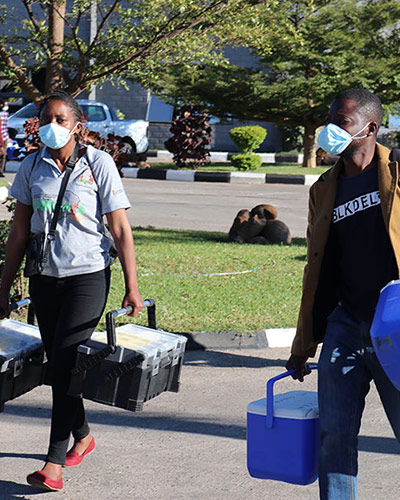
Monday, August 30, 2021
ZAMPHIA Prepares to Restart After Election Pause
After a one month pause, the Zambia Population-based HIV Impact Assessment (ZAMPHIA) is prepared to restart field data collection in September. The survey now enters its final stage of field work following a break in August for the 2021 Zambian general elections.
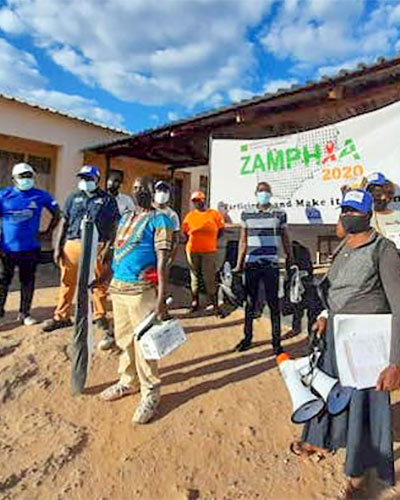
Tuesday, June 08, 2021
ZAMPHIA Survey Begins Fieldwork
The Zambia Population-Based HIV Impact Assessment (ZAMPHIA) is now underway! The survey was originally scheduled to take place in 2020 but was paused due to the COVID-19 pandemic. Now that COVID-19 in Zambia has improved, the Government of Zambia, in partnership with Ciheb and others, is moving forward with the relaunch of this PEPFAR-funded assessment and have put in place all necessary safety measures to protect staff and participants. ZAMPHIA is the second ever population-based HIV impact assessment performed in Zambia.
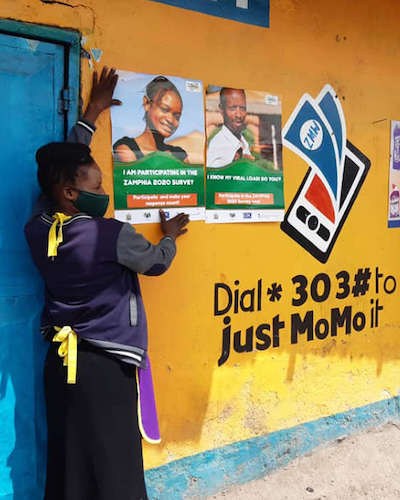
Thursday, May 27, 2021
ZAMPHIA Survey Prepares to Relaunch in Zambia
The Zambia Population-Based HIV Impact Assessment (ZAMPHIA) is preparing to recommence fieldwork at the beginning of May, and staff and communities are being mobilized in anticipation of the relaunch.

